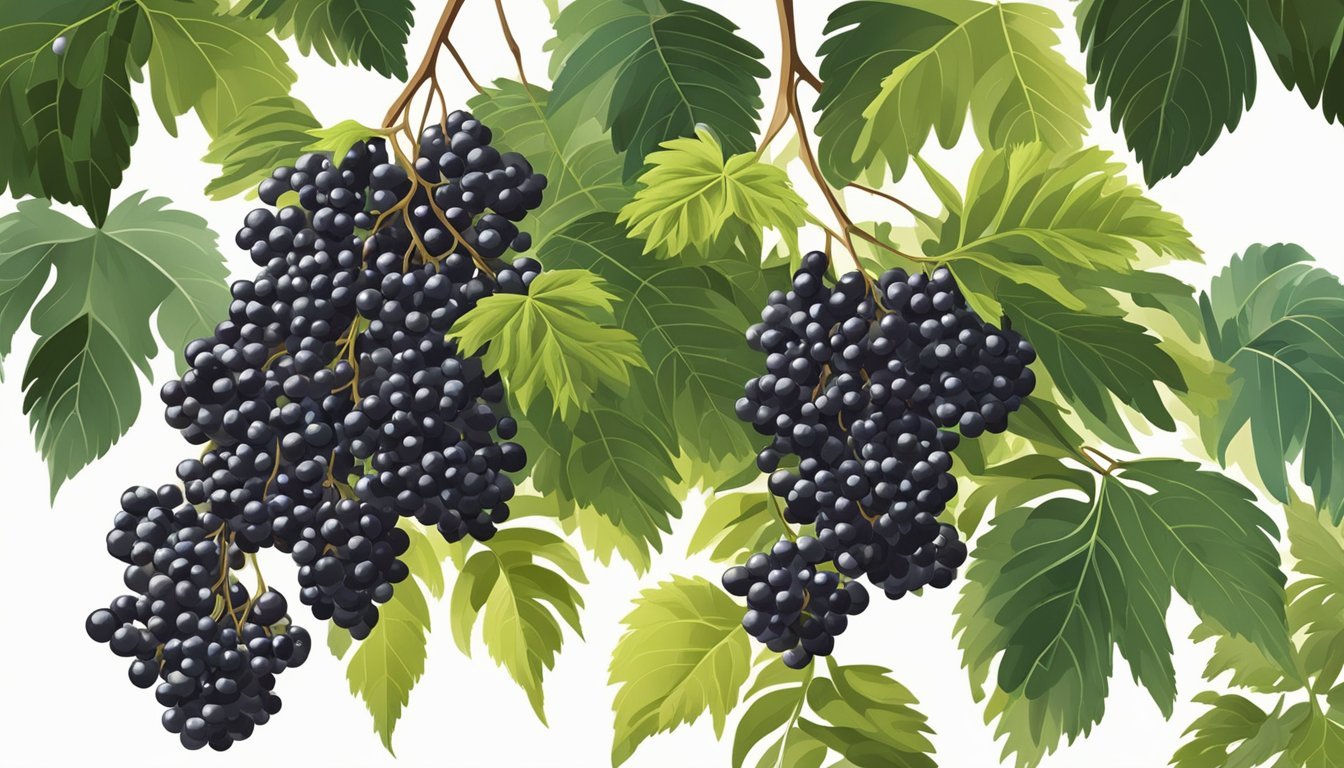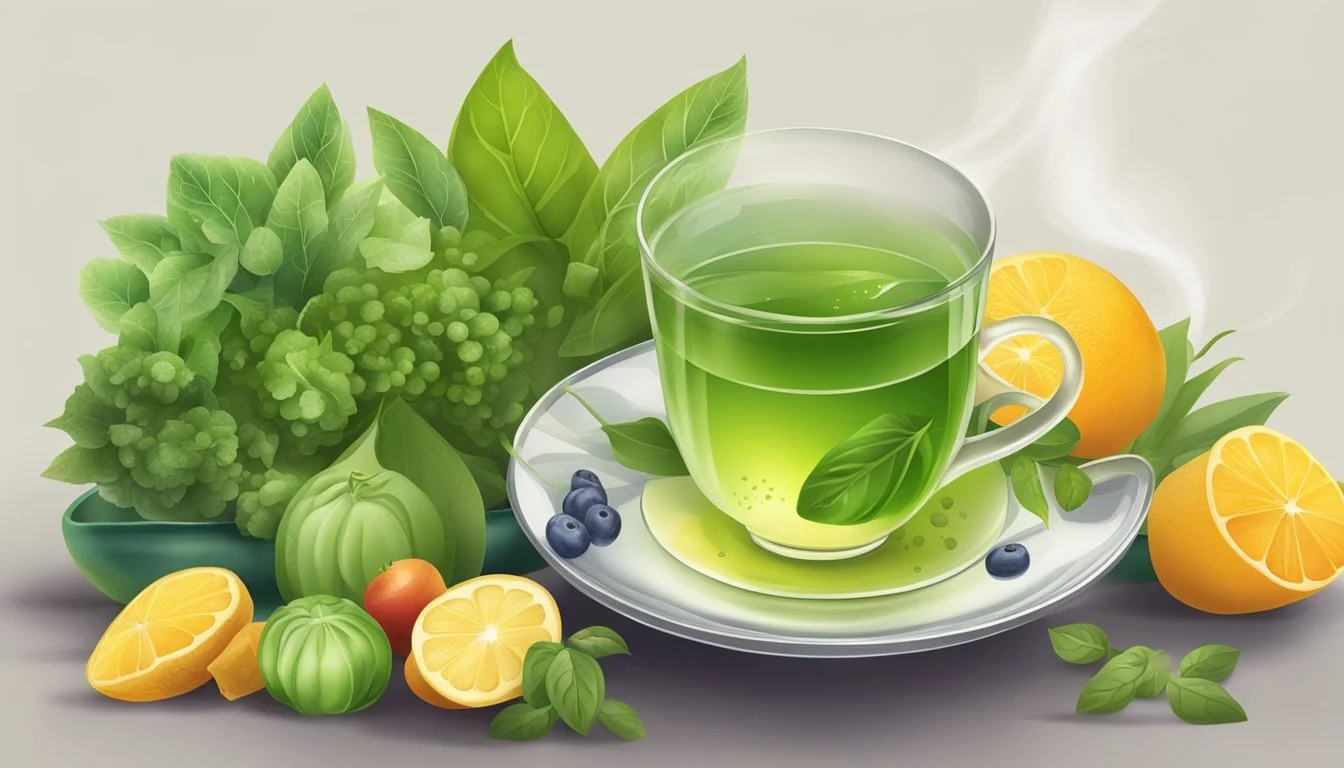Nutritious Foods Rich in Rutin
Top Sources for Optimal Health
Rutin is a bioflavonoid known for its powerful health benefits, including antioxidant properties and support for vascular health. This nutrient naturally occurs in several common foods and beverages, making it accessible for inclusion in a regular diet.
Recognized for its ability to help produce collagen and utilize vitamin C, rutin plays a crucial role in maintaining overall wellness. Understanding which foods are high in rutin can help individuals harness these benefits through their daily nutritional choices.
1) Buckwheat
Buckwheat is a highly-regarded source of rutin, a potent flavonoid. This pseudo-cereal is globally recognized for its nutritional benefits, particularly its antioxidant properties.
Rich in essential nutrients, buckwheat provides a steady supply of rutin, beneficial for vascular health and reducing inflammation. Its consumption can aid in maintaining healthy blood vessels.
Incorporating buckwheat into one's diet is simple and versatile. It can be used in making porridges, pancakes, and even noodles. This makes it an excellent choice for those looking to increase their intake of rutin.
2) Apples
Apples are a significant source of rutin, a powerful flavonoid known for its antioxidant properties. The presence of rutin in apples contributes to various health benefits, including vascular health and inflammation reduction.
To maximize the intake of rutin, it is essential to consume apples with the peel on. The peel contains most of the flavonoids, including rutin.
Opting for organically grown apples can help avoid the high pesticide levels often found on conventional apple peels. This ensures a healthier choice while preserving the nutritional benefits.
Including apples in the diet can be a simple and effective way to boost rutin intake. They are versatile and can be eaten raw, added to salads, or used in cooking and baking.
Keep the peel on whenever possible to maximize the health benefits. By doing so, one ensures they are getting the full spectrum of nutrients, including rutin.
3) Elderberries
Elderberries are known for their rich content of rutin, a powerful bioflavonoid. They offer a natural source of this nutrient, which contributes to their reputation for supporting overall health.
These small, dark berries are often used in syrups, teas, and supplements. Their high rutin content can help improve blood circulation and strengthen blood vessels.
Elderberries also provide other nutrients like vitamins A and C, making them a nutritious choice. Whether consumed fresh or in processed forms, they retain their beneficial properties.
In addition to rutin, elderberries contain antioxidants that protect the body from oxidative stress. This combination of nutrients enhances their potential health benefits.
4) Figs
Figs are a notable source of rutin, a powerful flavonoid with antioxidant properties. Studies have indicated that rutin levels in figs are significant and comparable to those in apples. This makes them a great choice for anyone looking to boost their intake of this beneficial compound.
In addition to rutin, figs offer other nutrients such as fiber, potassium, and vitamin B6. Regular consumption of figs may support digestive health, improve heart health, and aid in blood sugar regulation.
Figs can be enjoyed fresh or dried, making them a versatile addition to various dishes. Whether eaten alone, added to salads, or included in desserts, figs provide a tasty and nutritious way to benefit from rutin.
Incorporating figs into the diet not only helps increase rutin intake but also provides a range of other health benefits. For individuals seeking natural sources of this flavonoid, figs are an excellent and delicious option.
5) Grapes
Grapes are a notable source of rutin, a bioflavonoid with powerful antioxidant properties. This compound is found in the skin of grapes, contributing to their health benefits.
Rutin in grapes plays a role in strengthening blood vessels and improving circulation. Including grapes in a diet can aid in maintaining cardiovascular health.
Both red and green grapes contain rutin, although red grapes typically have higher concentrations. This makes them an excellent snack for those looking to boost their intake of natural flavonoids.
Grapes are also versatile and can be enjoyed fresh, dried as raisins, or as part of various dishes. Their rutin content remains beneficial regardless of how they are consumed.
6) Green Tea
Green tea is a well-known source of rutin, a bioflavonoid with antioxidant properties.
This beverage is lauded for its health benefits, including support for cardiovascular health.
Consuming green tea can contribute to improved blood circulation.
The rutin in green tea also supports vascular health.
Green tea's rutin content adds value to its already rich profile of beneficial compounds.
Regular consumption is easy to integrate into a daily routine.
Green tea is available in various forms, such as loose leaves and teabags.
Its mild flavor and versatility make it an appealing choice for many.
7) Olive Leaves
Olive leaves, often overshadowed by the fruit, are a significant source of rutin. This natural pigment, also found in apples and citrus, offers numerous health benefits.
Rutin in olive leaves contributes to vascular health and inflammation reduction. It's abundant in antioxidants, making it a beneficial addition to a balanced diet.
Aside from rutin, olive leaves contain other polyphenols that support heart health. This makes them an excellent choice for maintaining cardiovascular well-being.
Tea made from olive leaves is a popular way to consume these nutrients. Incorporating such teas into daily routines can be both easy and beneficial.
8) Onions
Onions are a notable source of rutin, a bioflavonoid known for its antioxidant properties. This pigment plays a crucial role in reducing inflammation and supporting vascular health.
Onions are commonly used worldwide, making them an accessible option for incorporating rutin into the diet.
In addition to rutin, onions offer other beneficial compounds such as quercetin. Quercetin works alongside rutin to enhance its antioxidant effects. Regular consumption of onions can, therefore, contribute to overall wellness.
Different varieties of onions, such as red, yellow, and white, all contain rutin, though the concentration may vary. Including a mix of these onions can provide a broader range of nutrients.
Cooking methods can impact rutin levels in onions. Eating raw onions in salads or as toppings preserves more of their rutin content compared to cooking them.
9) Roses (Rosa Rugosa)
Rosa rugosa, commonly known as rugosa rose, is notable for its high rutin content. This naturally occurring flavonoid offers significant health benefits due to its antioxidant properties.
The rose hips of Rosa rugosa are particularly potent, containing rutin levels ranging from 11.6 to 25.5 mg per 100 grams of dry weight. These rose hips are often described as having a tart apple-like flavor.
In addition to its high rutin content, Rosa rugosa also contains other beneficial compounds like kaempferol-3-O-glucoside and various polyphenols.
The use of Rosa rugosa in food products capitalizes on its nutritional and antioxidant profile. This makes it not only a valuable addition to diet but also an ingredient of interest in the food and pharmaceutical industries.
Studies have shown that extracts from Rosa rugosa have antibacterial and antioxidant activity, enhancing its potential health applications.
10) Sorghum
Sorghum is a versatile grain known for its impressive nutritional profile. It is rich in various compounds essential for health, including rutin. Rutin is a potent antioxidant found in sorghum that contributes to its health-promoting properties.
Sorghum grains contain significant amounts of starch, proteins, and polysaccharides. These components make it a valuable dietary staple in many regions. The rutin content in sorghum further enhances its nutritional benefits.
Studies have shown that rutin in sorghum may support vascular health and reduce inflammation. Its presence in the grain also contributes to the management of chronic diseases like heart disease and diabetes.
Given its routine inclusion in diets around the world, sorghum serves as an excellent source of rutin, making it a beneficial addition to a balanced diet.
Health Benefits of Rutin
Rutin is a bioflavonoid found in various fruits, vegetables, and plant-based foods. It offers numerous health benefits, including strong antioxidant properties, anti-inflammatory effects, and improved circulation.
Antioxidant Properties
Rutin is a potent antioxidant that helps neutralize free radicals in the body. Free radicals can cause oxidative stress, leading to cellular damage and chronic diseases. Rutin helps protect cells from this damage, contributing to overall cellular health.
By scavenging these harmful molecules, rutin supports the body's defense systems. It can also enhance the effectiveness of other antioxidants like Vitamin C, further boosting its protective role.
Anti-Inflammatory Effects
Rutin exhibits significant anti-inflammatory properties. Inflammation is a natural response to injury or infection but chronic inflammation can lead to various diseases. Rutin helps reduce inflammation by inhibiting the production of inflammatory cytokines.
This can be particularly beneficial for conditions such as arthritis, where inflammation causes pain and joint damage. By lowering inflammation, rutin can help manage symptoms and improve quality of life.
Improved Circulation
Rutin contributes to better blood circulation by strengthening capillaries and improving their flexibility. Strong, flexible capillaries are essential for efficient blood flow and the delivery of nutrients and oxygen to tissues.
It can prevent blood clots and improve venous insufficiency, reducing the risk of conditions like varicose veins. Enhanced circulation also supports cardiovascular health, helping maintain a healthy heart and vascular system.
How Rutin Affects Your Body
Rutin, a flavonoid found in various fruits and vegetables, plays a crucial role in maintaining cardiovascular health and enhancing nutrient absorption. It provides specific benefits to the body, including strengthening blood vessels and enhancing vitamin C absorption.
Strengthening Blood Vessels
Rutin significantly boosts the health of blood vessels. By scavenging free radicals with its antioxidant properties, it prevents oxidative stress, a major factor in cardiovascular diseases.
It helps fortify the capillary walls, reducing their fragility and permeability. This action minimizes conditions such as varicose veins and hemorrhoids.
Additionally, rutin's ability to improve circulation can aid in preventing blood clots by inhibiting platelet aggregation, which is vital for reducing the risk of stroke. This makes rutin a valuable nutrient for cardiovascular maintenance.
Enhancing Vitamin C Absorption
Rutin aids in the optimal utilization of vitamin C. This synergy boosts collagen production, critical for maintaining skin elasticity and wound healing.
The combination of rutin and vitamin C enhances immune function, producing a stronger resistance to infections. Rutin also protects vitamin C from oxidation, prolonging its active presence in the body.
By facilitating better absorption and utilization of vitamin C, rutin helps in maintaining overall health, particularly in terms of skin, bones, and the immune system. The partnership between these two nutrients highlights the importance of a balanced diet rich in natural compounds.









